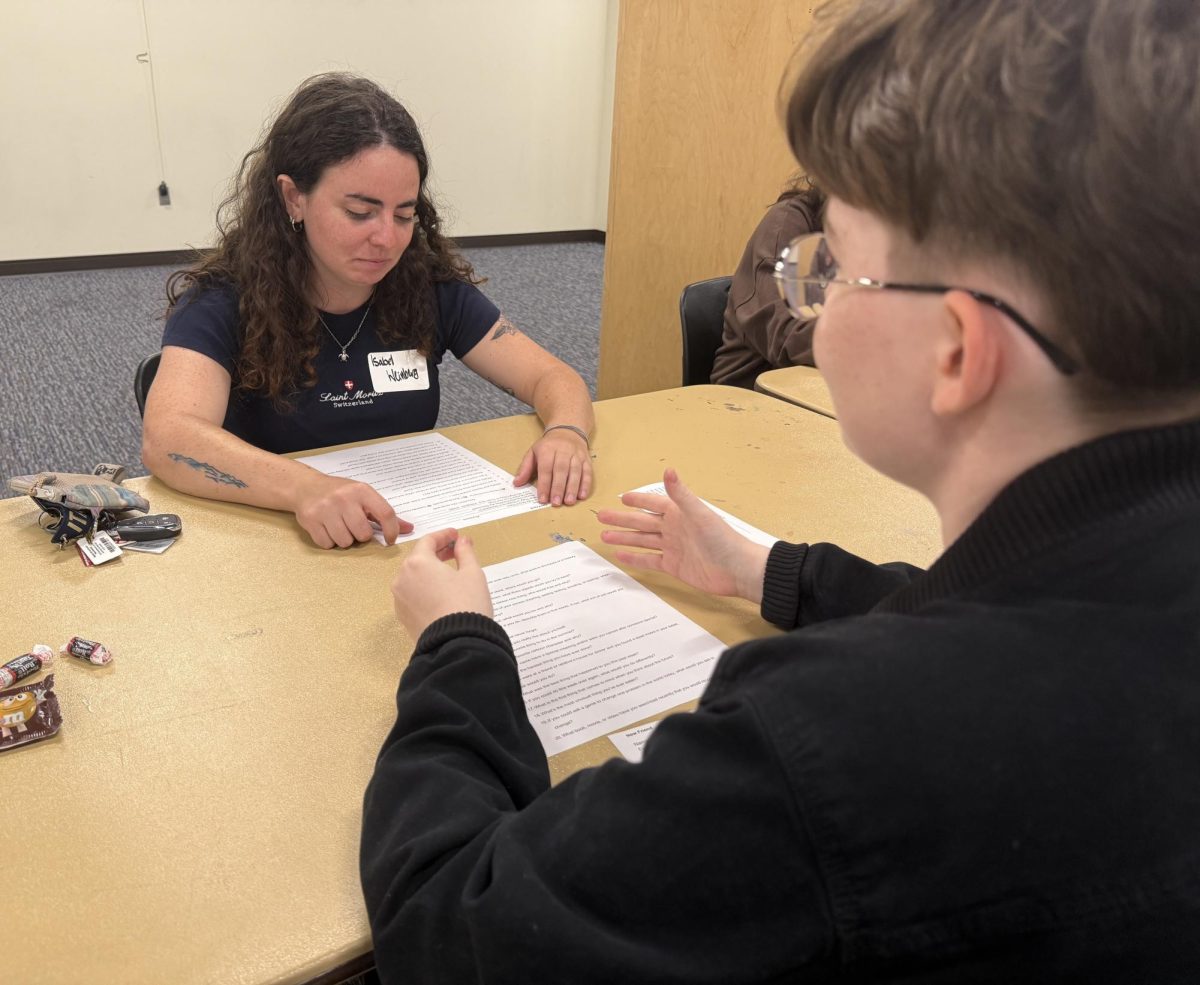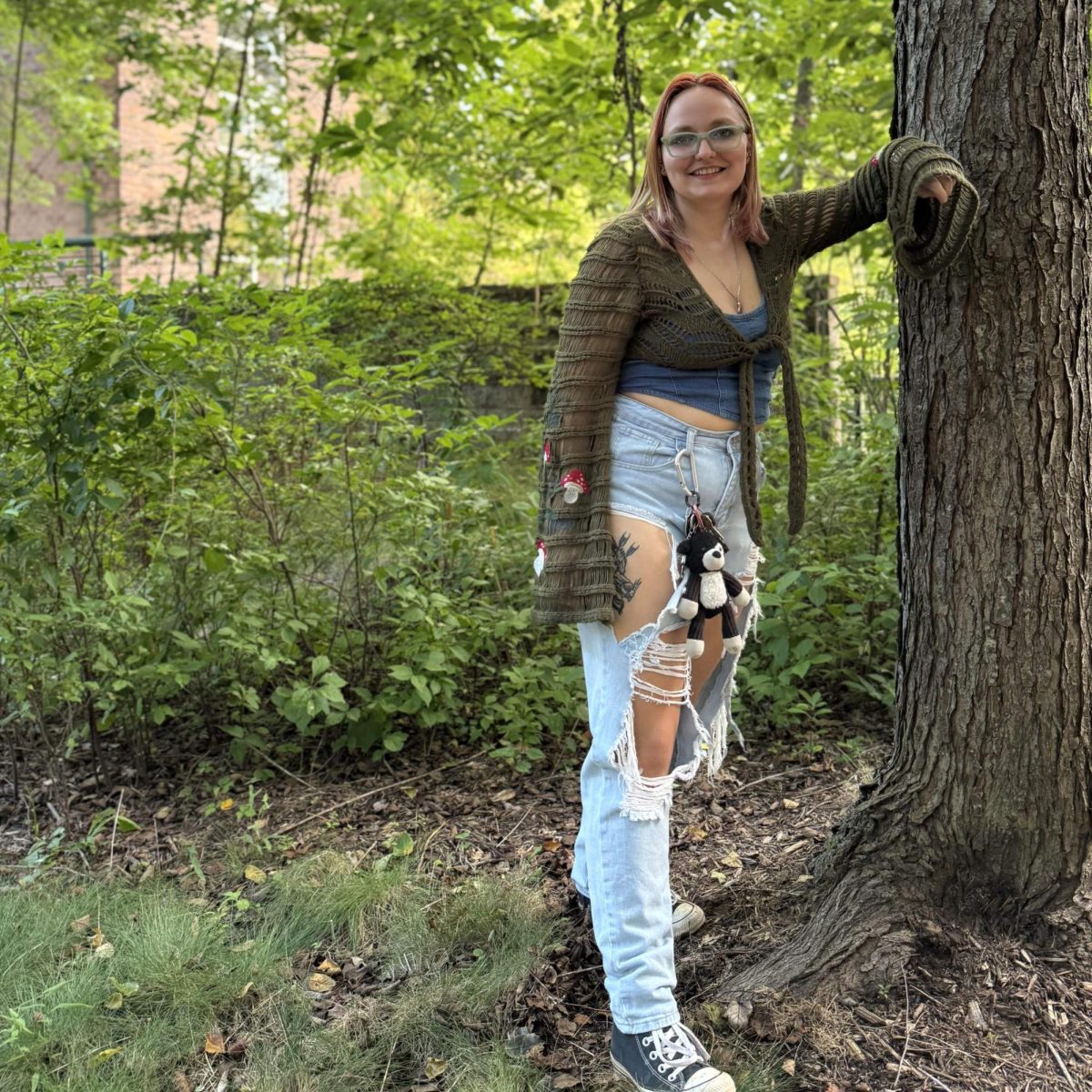Abby Zimmerman
Contributor
[email protected]

Walter Ziffer sits quietly in his comfortable living room on a calm afternoon, inspecting his latest creation, a hand-carved mezuzah, a small piece of wood inscribed with Hebrew words and intended to be fixed to the doorways of a Jewish home. At 92 years old, he still climbs up and down the narrow staircase to the workshop he has set up in his garage to make these small, religious works of art. It is a favorite hobby of the former engineer and professor of theology, and the finished products are sold in his synagogue’s gift shop.
On the wall a few feet away, over the wooden dining table, hangs a black and white photograph in a wooden frame. It is a family portrait, a woman in a wheelchair is surrounded by men, women and children who share similar noses, eyes and other features. They are all dressed in the fashions of the 1940s. All of this is easy enough to discern on first glance. More difficult to see is the sorrow behind it.
This photo shows Ziffer’s family. Eighty years ago, many of them were murdered in Nazi concentration camps – camps Ziffer endured as well.
Born in the Czech Republic in 1927, Ziffer describes a mostly idyllic childhood of love and learning. His father was an attorney and the president of the Jewish congregation, described by his son as a wise and loving man, he was well-known and respected in the community. His mother was giving, adored within the area, and his sister was tough. He describes her as both his best friend and his protector. He reminisces about spending sunlit afternoons reading and asking his father questions, while the smells of his mother’s cooking wafted through their home.
“They were wonderful, my family,” he says, with obvious affection in a gravelly voice tinged with the accent of his homeland. “And our life together was wonderful, too.”
Not every experience was golden. At 9 years old, Ziffer was walking home from school with a Hassidic boy when they were attacked by peers. The other boys threw rocks and jeered at them. “Filthy little Jew!” they shouted as the two boys ran for their lives.
“My mother hugged me, told me to forget it,” he remembers. “She said we should both be grateful I wasn’t hurt.”
But life was about to become much more difficult for the small family. They were in Poland when the Nazis invaded in 1939. The changes were drastic – his father lost his job, the community no longer respected them, and the new regime forced Ziffer and his sister, like all the other Jewish children, to attend Polish school, a change he described as “unbearable.”
The night of Sept. 1, Ziffer recalls waking up with a start. In the pit of his stomach, he felt something was wrong. He went looking for his father, his hero, to reassure himself. But his father wasn’t in his bed. He was on the balcony, pale, smoking a cigarette. Noticing his son, he reached for his hand.
“Walti, listen,” he said. The sounds of crunching glass and laughter echoed in the distance. “I think they’re burning our city down.”
A red glow lit the horizon as he looked up at his father. “The sun is coming up Daddy,” he said, pointing.
Ashes floated in the air as his father responded, “Yes, but our sun is setting.”
The ashes were from the synagogue, which burned to the ground with the sacred Torah scrolls inside. He remembers hearing a passerby remark snidely, “Well, they should have expected that.”
Sometime later, Ziffer and his family were evicted from their apartment, with only two suitcases allowed per person. In one day, the comfortable family was reduced to poverty. They were sent to live in a dance hall with 1,000 other Jews, where the last thing Ziffer expected happened.
He fell in love.
Her name was Lydia. She was a lovely girl, about his age. They spent all their time together, her existence the one bright spot in what was otherwise a miserable living situation.
“We just cared about each other, and that was important,” Ziffer says, recalling his young love with a smile.
His crush never had a chance to develop any further. Lydia and her family were killed, their bodies discovered after trying to cross to Soviet Russia, a safe haven for Jews.
Shortly after this tragedy, the Jews in the dance hall were ordered to prepare two suitcases, for what the Nazis were calling “resettlement in the East.” The group was marched to a junkyard, where S.S. soldiers sitting with guns and whips ordered them to hand over all valuables. When these transactions were complete, the families were separated, first by gender and then by age, young, middle or old. Ziffer had never been away from his parents before. He was 15 years old.
“I remember my mother, running after me crying ‘Walti, Walti don’t leave us!’” he says with the careful tone of someone who has told an emotional story time and time again. “She was hit by an S.S. soldier and shoved back into line.”
From that day on, Ziffer spent three years in seven different concentration camps. Many of them had the same routine. Their daily food ration was between 10 and 12 ounces of bread, and they were given “coffee (really, tasteless water)” in the mornings. At noon, the prisoners were given soup, a lukewarm concoction of cooked potato or beet peels.
“Some people would break their bread in half and save it for later, to make it last longer,” he recalls. “I used to say we were the ‘food philosophers’ because we talked about food all the time.”
The work varied based on location. In Camp Waldenburg, he and several others were charged with drilling holes into bedrock. The machinery used today was still a dream of the future – the prisoners drilled the holes manually, with metal rods an inch and a half in diameter. Two people would lift the pole, let it drop, over and over again, until the hole was between 8 and 10 inches deep. In winter, people’s hands would freeze to the steel.
“Our worst nightmare was getting infections from tearing our flesh,” he said. “If you were infected, you couldn’t work. If you couldn’t work? They sent you to Auschwitz to die.”
The prisoners were constantly insulted and dehumanized. Day by day, the Nazis tried to diminish their self-respect. They were called names, sworn at, beaten.
The first winter after the deportation, 15-year-old Ziffer was in Brande Camp. The worst of all the camps he experienced, Brande was a death factory, and death was merely entertainment for Kurt Pompe, the sadistic German commander. One day, Ziffer and a few other boys were called by a German officer, saying he had a job for them. They followed him to the barracks.
Inside lay a mound of naked corpses, their bodies contorted, their skin covered in blood and human excrement. The Nazis had doused them with cold water, followed immediately by scalding hot water taken from the vats where the underwear worn by the German officers boiled. They repeated this alternation until every last person had died. Ziffer and the other chosen were forced to cart the bodies to the forest, and then clean the filthy “wash barracks.”
“This wasn’t hell like you read about in the New Testament,” he says fiercely. “This was real hell. We were objects to them, and you can do whatever you want with an object.”
Time passed, though time meant nothing to them. The days passed, blurring into one another, an endless parade of work, hunger, insults and death. He forgot what it felt like to be truly human.
On May 8, 1945, he glanced up at the watch towers. Oddly, there were no soldiers at the top. Starved and exhausted, his brain refused to function, so he thought nothing of it. He stood, waiting for roll call as he did every morning, when the man next to him spoke.
“I think it’s over. Let’s try to get some food.”
They found food in a nearby truck and stuffed themselves until they passed out. The next memory he has is of waking in a soft bed, with a woman leaning over him. “You’re safe,” she promised. “Rest.” His eyes closed once more.
He spent a few days in that house, but his real goal was to find his family. His mother, his sister and his father. Were they alive?
He walked into the street, where a man was riding past on a bicycle. He was severely malnourished, a skeleton with skin and hair. But when he ordered the man to hand over his bike, no questions were asked. He pedaled fast and hard, to the nearest female camp, where he questioned the residents. Was there anyone named Ziffer there?
One of the women answered. Yes, there were two Ziffer women. They were in her barracks. Now they were up the road, helping at a center. He left at once.
Arriving in the building, several of the women smiled at him. None of them looked familiar. He sat in a chair to wait, knowing in his gut they would come.
A few minutes later, three women entered the room carrying pots of food. His mother. His sister. His cousin. They glanced up and saw him, but only smiled with pity in their eyes. He was so thin his own mother didn’t know him.
“I walked right up to her,” he remembers with a smile. “I walked up and said, ‘Momma, it’s me, I’m Walti.’ I don’t remember much after that, just a lot of crying.” Together, they returned to their hometown. His father was there waiting for them.
Ziffer eventually migrated to America, where he received a degree in engineering and a doctorate in theology. He published a 400-page memoir and travels regularly, talking about his experiences. That’s how he met his wife.
Gail Rosenthal, a small, soft-spoken woman with a surprising amount of sass, grew up in Poughkeepsie, New York, and received a degree from Syracuse University. Her first husband, Jerry, was working for RCA, working under two-year government contracts. They spent a lot of time moving from place to place, but it was Maine where her life really changed.
“I met Walter in Maine. He had been living there for two years already, and I moved up there because Jerry was offered a job there after he retired from RCA,” she explains simply. “Both his marriage and mine were not good before we met, and we met and decided that we would be together.”
Married in 1999, the couple obviously have deep affection for one another. Sitting in their living room, Jewish history books scattered on the coffee table, they talk and banter quietly. She describes her husband as affectionate, artistic and inventive. He takes life seriously. There is little small talk in this house, everything spoken seems worthy, important and intelligent.
She says Ziffer lives a very public life. He wants, needs to talk about what he went through, to share it with as many people as possible. He loves to reminisce about his life before the war. He enjoys going to speak at schools. But, she reminds herself and him, he is 92 years old.
“He gets tired. He’s 92 now, and he’s fairly spry for 92, but he gets very, very tired. And he feels that he cannot refuse. This is his mission. Who’s gonna do it, if not him?” she explains, with a mixture of pride and weariness.
On the other side of town, the inhabitants of a cottage in Fletcher have something in common with the professor they’ve never met. Craig Zimmerman is the owner of a technology company, the father of two teenage girls and the grandson of an Auschwitz survivor.
The Nazis deported Alice Jacobs, later Cohen, to Auschwitz near the end of the war with her mother and four siblings, one of whom died in the concentration camp. Like the many other Hungarians arriving in the camps at that time, she did not receive a tattoo.
Zimmerman grew up in a Jewish household in Brooklyn, New York. He was very close with his grandmother, who lived close by. His grandparents kept a crib for him at their house. The quintessential Jewish grandmother, she was warm, loving, devoted to her family, and loved to cook. Her farfel, matzah brie and stuffed cabbage are still the stuff of family legend. She liked to play rummikub and watch “The Price is Right” with her grandson. The thing she didn’t like to do? Talk about her experiences.
“We kept trying to get her to talk, I kept asking her about it, telling her she had to tell us her story, she had to tell us her story. And she kept saying, ‘Maybe one day.’ She just didn’t want to talk about it,” Zimmerman recalls ruefully.
Cohen lost her brother, Joseph, during the Holocaust, though no one knows the exact story. Her experiences and trauma stayed with her, and she rarely opened up. Her daughter, Zimmerman’s mother, recalled her waking up from nightmares, her screams echoing through the house.
Nothing could coax the story out of her, though Zimmerman tried for several years. He even contacted Steven Spielberg and the Shoah Foundation. But one day, something changed. They were sitting down to lunch, Zimmerman said, when it happened.
“She just started telling us what happened after the war, after they got liberated. And my wife and I just sat there listening, because it was amazing to hear the story she was telling. And as is typical of our family, my mother was like, ‘OK it’s 4 o’clock, time to go.’ I looked at my mother and said, ‘I’ve waited 30 years to hear this story, you’re not going anywhere,’” Zimmerman remembers. “I wanted to hear that story from Grandma.”
This occurrence was rare and not repeated. The next details were recovered many years later, after Zimmerman’s daughters were born and his grandmother had passed. They were cleaning out her house when they found a few notes, written in her husband’s handwriting. It looked like she had dictated her experiences to him.
“One of the notes said that they put her in the infirmary in Auschwitz, and it was Dr. (Josef) Mengele. And her mother broke her out of the infirmary,” Zimmerman said, obvious awe in his voice at his great-grandmother’s bravery and the rare treasure mixed in with ordinary papers.
Alice Cohen, like many of the Holocaust survivors, passed on. She left her story to be pieced together by her loved ones and the scattered clues she left among them. And yet, Zimmerman says they must collect the memories left among the remaining survivors, before it is too late.
“We can’t ever forget. If we forget, it happens again. And I think those first-hand accounts are the only thing we have to show the reality of what actually happened, and what the experience was,” Zimmerman explained quietly. “I think we have to continue to talk about it, to make sure people are aware of it, to make sure it goes l’dor vador, which is Hebrew for ‘from generation to generation.’”






















